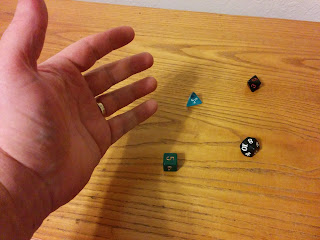As most of you know, I was able to attend Gen Con last week. It was my first time ever to attend a convention (apart from the small local one that doesn't really count). I had no idea what to expect from conventions in general, nor from Gen Con in particular. Needless to say, I had ridiculous amounts of fun. I got to play lots of games, see lots of panels, learn lots of things, and of course, buy lots of games. I have a lot of ideas for articles about my time at Gen Con, so look for those in upcoming weeks. Just a small sample of some of the entries I'll be writing include:
- An interview with Emily Whitehouse of On the Lamb Games
- An article about crossplay and genderbending
- Reviews of some new release games that debuted at the con
- A discussion of Zombie Orpheus Entertainment






